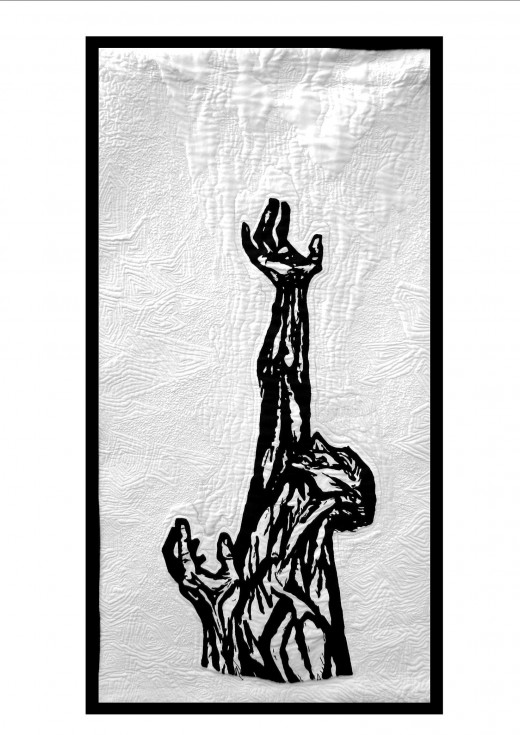Out of The Depths I Cry
Psalm 130
A Song of Ascents.
1 Out of the depths I cry to you, O LORD.
2 Lord, hear my voice!
Let your ears be attentive
to the voice of my supplications!
3 If you, O LORD, should mark iniquities,
Lord, who could stand?
4 But there is forgiveness with you,
so that you may be revered.
5 I wait for the LORD, my soul waits,
and in his word I hope;
6 my soul waits for the Lord
more than those who watch for the morning,
more than those who watch for the morning.
7 O Israel, hope in the LORD!
For with the Lord there is steadfast love,
and with him is great power to redeem.
8 It is he who will redeem Israel
from all its iniquities.

Introduction
A few years ago two fourteen year old boys went to work at the Pass Go’s Dollar and Video store in Claysville, PA. Ronnie Pascoe, the owner of the downtown business, hired the two teens, Dylan Moore and Ryan Morris to clean out the basement to make room for more storage. While the boys were cleaning, they broke through the cover of a cistern and fell twenty feet into frigid, shoulder-deep water. The owner of the building was not even aware that this old-fashioned cistern well was even in the basement of his 19th century Main Street store.
As you can imagine, the boys started panicking – not knowing where they were, and more importantly, how were they going to get out! One boy climbed up on the shoulders of the other to yell up the well. Forty-five minutes went by before they were able to get someone’s attention, and then they had to wait another twenty-five minutes more before the local firefighters could lift the boys out. Because the hole of the well that led down to the cistern was not very wide, the fire-rescue team had to get the boys out in a manual fashion, with a hand-over hand lift. Once they were out of the cold water, the boys recovered quickly, suffering only some scrapes and bruises from the ordeal.
In describing their experience for the local newspaper. Ryan said that he remembered something that helped the two of them when they were down in the depths: “If you’re stuck somewhere,” he said, “you got to try to keep calm and not use much energy.” He also said that he prayed, “the whole time.”
Our Depths
On May 24, 1738, a troubled man went to the morning prayer service at St. Paul’s Cathedral in London, England. This man was troubled because, even though he knew about God and the ways of God, he struggled with having a personal understanding of that knowledge. He was restless, defeated, and felt no peace in this troubled soul. It was as if the whole structure and purpose of his faith was completely in vain.
As part of the liturgy for that day at St. Paul’s, this troubled man heard performed the “de profundis.” De profundis is the Latin title of Psalm 130, based on its first words, “out of the depths.” In the words of the psalm, the troubled man heard about God’s desire to save us, even from the deepest depths of our despair. The troubled man pondered this all day. In the evening, while still struggling to know God in a personal way and to have assurance of God’s love for him, he was invited to a Bible study. So that evening, rather unwillingly, he went to the study that was being held at a place on Aldersgate Street. At the meeting, the leader of the study read from the preface of Martin Luther’s commentary of the book of Romans. At about a quarter to nine that evening, while the leader described the change that God works in the heart through faith in Christ, this troubled man felt his own heart strangely warmed. Writing in his journal that night, he described the realization that ended his struggle: “I felt I did trust in Christ, Christ alone for salvation; and an assurance was given me that He had taken away my sins, even mine, and saved me from the law of sin and death.”
Who was this troubled man, who was troubled no more when he found the assurance of God’s love and a realization of the forgiveness of his sins? It was John Wesley. You might recognize Wesley as the man who started the Wesleyan Revival in England, and was the founder of the Methodist movement. This revival In England later spread to America, and in the mid-1800s it had a major impact in the mid-West region of the U.S. during the revival that became known as the Second Great Awakening.
Before John Wesley came to understand God’s grace, he was a person who was down in the depths. He may not have been physically down in the depths like the two boys in a well; he was not stuck in a cold, dark, forgotten cistern, but the depth of his despair was just as profound.
You might remember the story of the thirty Chilean miners trapped in the mine cave-in about four years ago; Wesley may not have been trapped in a dark mine, but he was trapped in the dark despair of his sin none the less. What about us? There is a depth we find ourselves in when we are separated from God.
One obvious depth we find ourselves in is that we are separated from God. God is holy. Our sin causes a barrier between us and God. We are estranged and out of fellowship with God; we are cut off and cast out. The psalm writer describes sin like being down in a pit. “Out of the depths, I cry to you, O God. If you were to notice our iniquities, we would not make it – we couldn’t endure!” Whenever there is an issue of unconfessed sin between us and God, we will feel like we are trapped in the depths.
Another way that we find ourselves down in the depths is with the kinds of things we looked at in the first Hub in this series. In the Hub, "Out Of Exile we looked at the image of feeling like we were in exile – away from our proper spiritual homeland. This happens when our lives get thrown out of kilter by all sorts of troubles and problems that come our way: It could be things like and illness, a broken relationship, depression, hurtful circumstances. These same kind of things can put us down in the depths. The image of depth is another way of describing how life can be horribly, terribly hard and painful.
How Do We Get Out?
This Hub is the second in a series dealing with the Psalms of Ascent. Starting with Psalm 120, and continuing to Psalm 134, there are fifteen pilgrimage songs. These songs were sung while making the journey to worship at the temple in Jerusalem. The Song of Ascents sing about many common things concerning our experience as God’s people.
We don’t make the pilgrimage journey to the temple in Jerusalem like the ancient worshipers did, but we are on a journey – a journey through life. And in that pilgrimage journey, we seek to grow closer to God. What can Psalm 130 say to us today? How can Psalm 130 help us grow closer to God?
It’s safe to say, no one wants to stay down in the depths. How do we get out when we find ourselves in the depths? When the cave-in happened at the San Jose’ copper mine near Copiano’, Chile on August 5, 2010, thirty-three men became trapped in the depths of the mine. Immediately a rescue effort began that includes drilling a relief tube down to where the miners were trapped. It wasn’t long before supplies were able to be lowered to the trapped men, but getting them out of the mine was another story altogether.
Over two months later the happy day came when a large enough shaft was drilled, and a rescue capsule was developed. The rescue capsule was an engineering marvel: Lowered down the relief shaft to where the miners were, the capsule – named "Fenix 2" – was just barely wide enough and long enough for a slim man to fit in so that they could be lifted out of the mine. On October 12, the first man was lifted to safety and twenty-four hours later, the last man was also lifted out. The cost of the rescue was an estimated $20 million. What is our “phoenix” rescue capsule that can lift us out of the depths?
1) The first is to cry out to God.
A woman asked her husband to pray for her when she was dealing with a problem. The man responded, “Oh, has it come to that?!” Why do we make prayer our last resort? We should be in constant communication with God. But when we find ourselves feeling like we are cut off from God, for whatever reason, we need to cry out to God to seek out salvation. “Out of the depths, I cry to you, O LORD.” the psalmist wrote. We don’t need to climb up on our buddy’s shoulders to yell up the well, we only need to pray and call out to God. God is always eager and ready to respond to our cries for help.
2) Then we need to acknowledge our sin.
In v. 3, the psalmist realizes that it is his sin that has caused him to be down in the depths and be separated from God. “God, if you kept a record of wrongdoings, who could stand a chance?” The obvious answer to this rhetorical question is that no one would; no one could stand. No one could possibly measure up to God’s standard. So, we need to call out to God, acknowledge our neediness and dependence on God. It is only then when we are rescued from the depths.
3) Next we need to receive God’s forgiveness.
Verses 3 & 4 are one of those incredible combinations in Scripture: we are faced with the horrible realization of the inescapable problem in one verse, then the next verse starts with the word, “but.” “If you were to count our wrongdoings, O God, no one could make it. But there is forgiveness with you!’ I like how The Message reads: “As it turns out, forgiveness is your habit, and that’s why you’re worshipped.” Wow! There is forgiveness with God; forgiveness is God’s habit. We’ve sinned. We’re cut off from God; we’re trapped, down in the depths. What can we do? We’re trapped in the depths and we cannot get out.
As we call out to God and are offered God’s forgiveness, we need to reach out to God and accept God’s forgiveness. We need to accept God’s forgiveness.
4) We also need to wait and hope.
God is lifting you out of the depths, but our rescue does not always happen right away. We need to wait. Oh, that’s not easy, is it? But you know, the same trust that makes waiting on God and God’s perfect timing is the same faith and trust that we used when we cried out to God in the first place. We need to wait and hope. So often, people go through life with a kind of hopeless resignation: “Well, I’m just a hopin’ and a prayin’. Maybe God will answer…” Child of God, that’s no way to hope, that’s no way to pray! We are challenged to be expectant for God to act in a mighty way. This expectancy is compared to a watchman waiting expectantly for the dawn. “My soul waits for the Lord more than the watchman waits for the morning, more than the watchman waits for the morning.
When I was in the U.S. Air Force as a security policeman, one of my duty stations was at the NORAD underground command post at Cheyenne Mountain, near Colorado Springs, CO. My favorite duty post was at the back gate of the tunnel that led to the facility. The guard station overlooked the Great Plains. On the midnight shift, I used to like to look out on the expanse of the Plains and wait for the dawn. I would spend hours waiting, expectantly. I would try to guess where in the blackness of the night where the first signs of the sun would appear. First a dark maroon ribbon would appear across the horizon. Then the sky would turn from inky blackness to various shades of blue until the sun would finally appear. As it rose, it illuminated the whole landscape. The morning had come! My vigil was over; my waiting was at an end.
You know, our waiting and hoping is rewarded. God has rich blessings in store for our faith and trust. An eager young man went to an interview. As the interviewer read down the application, she became puzzled about something. “I see that you put down ASAP in the space where it asks when you are available,” said the interviewer. “I know what ASAP means, As Soon As Possible, but I see also that in the space asking about expected salary, you wrote AMAP, I don’t know what that means.” “Oh,” said the eager job seeker, “It means: As Much As Possible!” Well, that may not be a good strategy for getting a job, but it is exactly the situation with God’s blessings. Some Bible translations do not show this very clearly. In the NRSV, where it says, “and with [God] is great power to redeem.” The NIV is much better when it says, “with [God] is full redemption.” Other versions are even richer: KJV & RSV – “plenteous redemption”; NLT – “[God’s] redemption overflows”; The Message – “with God’s arrival comes generous redemption.” That’s what awaits us when we call out from the depths.
Conclusion
The really striking thing about Psalm 130 is the writer’s belief that God is somehow present in the depths. Despite all the things that the depths represent – all of those forces that oppose God and ourselves – somehow God is still there; God is there in the depths, ready to save.
My wife and I have recently been re-watching the DVDs of the TV show “West Wing.” "West Wing" was a show that aired in the early tens, which depicted the behind the scenes work in the White House. There was a powerful episode involving the character Josh Lyman. In an earlier episode, Josh had gone through a terrible trauma, and now he was beginning to show signs of strain. His friends and co-workers became concerned that he needed help, and he was ordered to sit with a trauma counselor. At first Josh was resistant to the counseling, until after several hours of therapy, he realized that he had a serious problem: he had post traumatic stress syndrome.
This scared Josh greatly because of his job. He was the Deputy to the Chief of Staff for the President of the United States, how would he be able to keep his job working in the White House if he had a psychological problem? At the end of the episode, Josh walks down the hall after the counseling session is over, and he is met by his boss Leo McGarey. Kind of surprised to see him, Josh asked why Leo had waited for him, and Josh shared his concerns about his future. Leo, who by the way was a recovering alcoholic, responded by telling what at first seemed like a dumb joke:
“A guy fell into a hole and couldn’t get out. After awhile a doctor came by and the guy down the hole calls up, “Hey Doc, I’m down in this hole, can you help me out?” So the doctor writes out a prescription, throws it down into the hole and then goes on his way. A little while later a priest came by and the guy calls up, “Hey Father, I’m trapped down in this hole, can you help me out?” So, the priest writes a prayer on a piece of paper, throws it down to the guy, and goes on his way. A little while later the guy’s best friend came by and he calls up, “Hey Joe, I’m down in this hole, can you help me out?” So his friend jumps down in the hole with him. “What did you do that for?” they guy asks, “Now we’re both down here.” “Yeah,” says his friend, “but I’ve been down in this hole before, and I know the way out.” Then Leo said to Josh, “As long as I have a job here, you have a job here.”
That’s the way it is for us who trust our lives to Jesus Christ: Jesus came to earth to live with us, to show God’s unfailing love for us. He died to save us from our sins and to rescue us from the depths. Jesus came down into the depths with us! He’s down there in the depths with you. Call out to Him because He, Jesus, our Savior, knows the way out.
Video of Terry Oldfield's "de profundis"
- Out of the Depths - De Profundis by Terry Oldfield - YouTube
Watching the sunset, listening to the the waves and the sound of the whalesong from across the ocean. A time of deep reflection and meditation. Lord hear my ...








